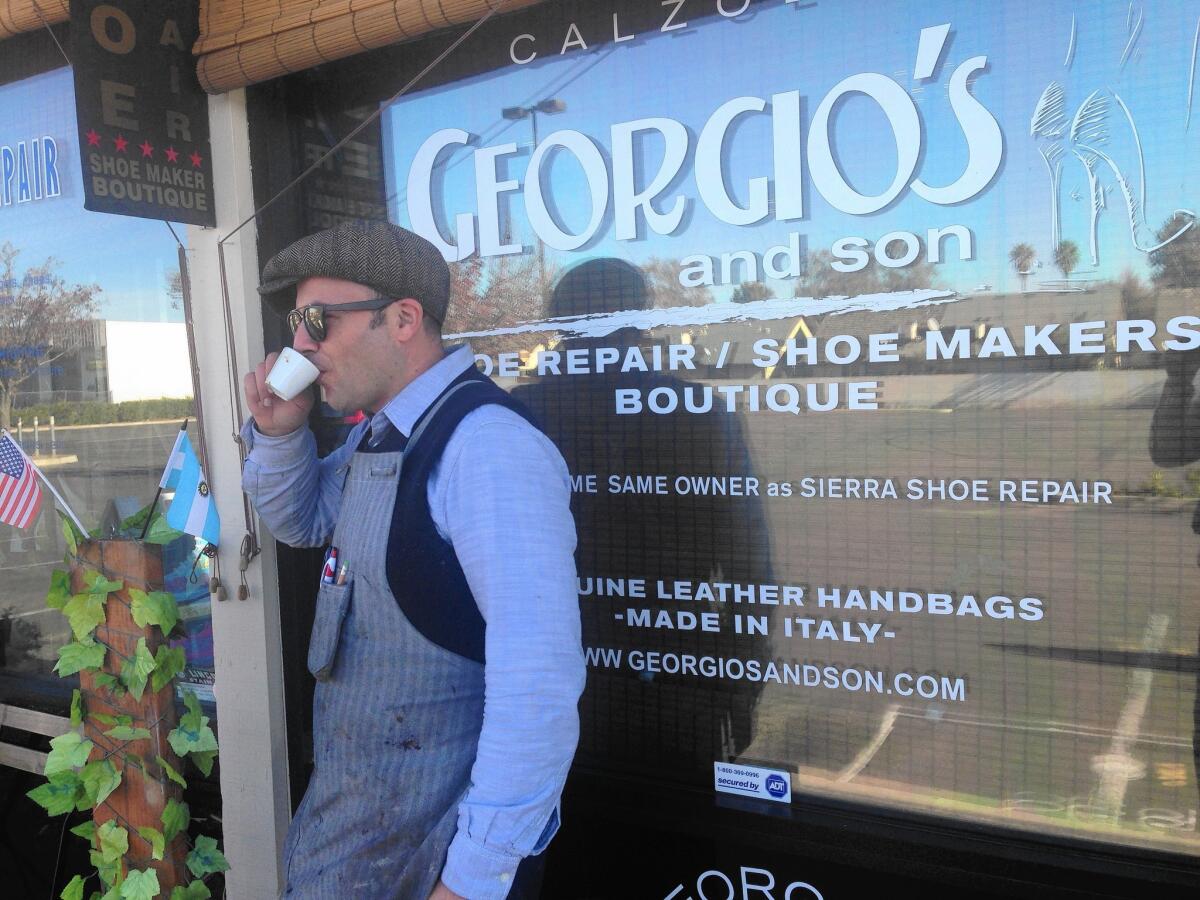Great Read: After shoemaker’s violent death, an outpouring of goodwill

The silver-haired woman in a jacket of robin’s-egg blue marched straight to the counter of the shoe repair shop.
“Are you the son?” Marcelle Power asked.
Arsen “Georgio” Sheklian said yes, and she reached up to hold his face in her hands.
“I know what it’s like to lose a loved one, but it’s even worse the way you lost yours,” she said.
The two nodded in silent conversation before getting down to business: three pairs of shoes, one of them glitter-gold flats she was considering wearing to her 95th-birthday party at Roger Rocka’s Dinner Theater.
The first estimate was $150. Power decided to keep the gold flats out of the equation.
Sheklian snatched them back.
“Tell you what, $50 for all of them. It’s a birthday present,” he said, dancing the sparkly shoes out of her reach.
“Thank you, sir. I’m sure your father was a kind man,” she said. “It’s good you’re taking over.”
::
The tiny shop, filled with vintage machinery, a promise of good service handwritten in Italian on a chalkboard and lovingly displayed leather goods (designed by father and son), seems as if it should sit on a cobblestone street, with a vegetable vendor across the way. But it’s in a strip mall with a sign that glows at night — Shoe Repair, Tattoos, Piercing, Guns, Dollar General.
Each morning Sheklian’s father, George, would take coffee to his neighbors: a medical supply store, a Zumba studio and the gun shop next door.
He had two coffees in his hands Dec. 4 when armed, masked robbers burst out of Fresno Firearms, one of them hitting the 85-year-old so hard he flew off the sidewalk, landing on the asphalt of the parking lot.
The younger Sheklian, 38, ran to the back of the store to get a pillow for his father’s bleeding head. His father told him, “Tell your mother I love her,” before he lost consciousness.
It was a big crime story in this Central Valley city: Grainy robbery footage nightly on the evening news. The news conference with the police chief offering a $15,000 reward. Sheklian’s fate tracked in headlines: “85-year-old Man Injured In Gun Store Robbery,” “85-year-old Man in Critical Condition,” “Services Set for George Sheklian.”
But weeks after the din subsided, a quiet pilgrimage of support formed: friends and strangers bringing in shoes.
On this day, right after first-time customer Power left — reminding Sheklian that at her age, all her shoes would need nonskid soles — Lynn Jenkins made his first visit to the shop too, bringing in cowboy boots.
He didn’t say anything directly about the elder Sheklian’s death, just noted that maybe he would need his boots for dancing because “we only have so much time. Got to make it matter.”
He had driven from Coarsegold, almost an hour away, and had rummaged in the depths of his closet looking for shoes in need of repair.
“I read what happened and thought I’d bring him work,” he said out of earshot of Sheklian. “Sometimes you need to keep busy, keep your mind off things. I know — we all know — about that.”
A few minutes after he left, Claudia Daw strode in with the no-nonsense air of an outdoors woman.
She had come in to pick up her “leg of mutton” — a holster for a shotgun.
Sheklian told her it was $30.
“No!” she almost shouted. “It cost you at least $50 just to make this.”
But she had bought all those shoe supplies the week before, he said. He knew it was just to help them out. Who needed that much shoe polish?
“Charge me what the job is worth,” Daw, who had also driven from Coarsegold, told him firmly. “You’re an artisan, and it’s hard to find a tradesman who knows what he’s doing.”
::
Sheklian hadn’t planned on being a shoemaker like his father.
Three years ago he was a musician living in Parma, Italy, playing rockabilly under his stage name, Arsen Roulette. Women were tossing underthings at his head, not bringing in broken heels.
He came home for his sister Elizabeth’s wedding. His father had a stroke, and he stayed. Sierra Shoe Repair got a second name that his dad was thrilled to have painted on the window: “Georgio’s and Son.”
His father had taught him the craft as a child, making him come in after school. He thought it was important his musician son had a trade to fall back on, especially after a punk band period.
Sheklian remembers telling his father once in boyish anger: “What do you know? You’re nothing but a shoemaker.”
Shortly before his father died, he reminded his father of those stupid words and told him, “Dad, you’re my hero.”
But usually they expressed their closeness through more everyday conversation:
“Dad! Why you gotta leave such a mess?”
“Don’t be a jackass. I know where everything is.”
Many people placed the older Georgio’s rolling accent as Italian, but it was Argentine. He was born in Buenos Aires. He left school at age 8 to help support his family by shining shoes and found a lifelong passion for crafting them.
Later, he was a professional soccer player, a judo champion and rode a horse in the Argentine cavalry before immigrating to Fresno and starting a shoe repair shop in 1962.
“I loved his stories,” Sheklian said. “He had a lot of them.”
::
Every morning Sheklian takes coffee to the neighboring businesses, as his dad did.
The first day he took over the custom, Kevin Cook, owner of First Choice Medical supply store, talked him through doing it exactly the same way.
“First, you have to flirt with Lydia. Tell her Ryan should take her to Hawaii. Tell her you’ll take her to Hawaii if he doesn’t.”
Once, on one of Cook’s busiest days, Georgio Sr. had frantically waved him over to the shoe repair shop. “C’mon, c’mon, come with me now!” When they got there he pointed to a chair:
“Now, sit down for a minute.”
He had a fondness for watching the Zumba classes and was forever picking out one of the exercisers as the future wife of 24-year-old Zachary Clark, billing manager for the medical supply store.
His latest choice had an expletive tattooed on her knuckles.
“My dad didn’t discriminate. Never,” Sheklian said with a laugh.
Clark saw the violence. He couldn’t sleep for weeks.
“It’s getting a little better. But a week ago I would have told you I didn’t think it ever could,” he said.
Sheklian heard the bell of his shop and hurried back. Clark can’t quite believe the endless parade of strangers with shoes and the way Sheklian has kept the shop going.
“By the time we met George, he’d had the stroke. He was frail. But there was always something about him. You knew George was in charge,” Clark said. “But Georgio, I thought he was a real softy. Now I look at him and think, ‘That’s one tough son of a bitch.’”
::
Sheklian’s mother, Mabel, came by the shop because she didn’t want to go home after the gym. She wanted to smell leather and the espresso machine Sheklian keeps on one side of the shop across from his father’s coffee maker.
She had always told her children she was engaged to their father, 22 years her senior, within a month of meeting him during one of his visits home to Argentina.
Actually, it was an hour.
“He was so handsome. And I always loved silver hair.”
The next day, his younger brother Alex spent the afternoon in the shop with his girlfriend and her grandmother. He liked watching the string of people bringing in their shoes as a kindness.
“What happened to my dad was awful. But then all these people showed me there’s a lot of beauty in this world.”
The family was worried most about Alex. He was adrift after the violence. He said he’s now figured out his role.
“If my brother’s the rock, I’m going to be the glue. If any pieces fall off the rock, I’m going to be here to stick them back on.”
Three representatives of a major fashion retailer came for a scheduled visit. Sheklian and his father had been in the midst of signing a contract with them after showing some of their leather goods during New York Fashion Week.
They told Sheklian he needed to think bigger than Fresno. No, bigger than San Francisco. Not even New York. He needed to be thinking about a manufacturing plant in Milan.
“My dad would have loved this,” he said. “He loved attention and adventure.”
For now, without his dad’s help, the shoes are piling up — every cubbyhole filled.
He picked up the last pair of shoes his father touched before he died — a pair of heavy boots belonging to a construction worker — and started stitching them back together.
Twitter: @dianamarcum
More to Read
Start your day right
Sign up for Essential California for news, features and recommendations from the L.A. Times and beyond in your inbox six days a week.
You may occasionally receive promotional content from the Los Angeles Times.






